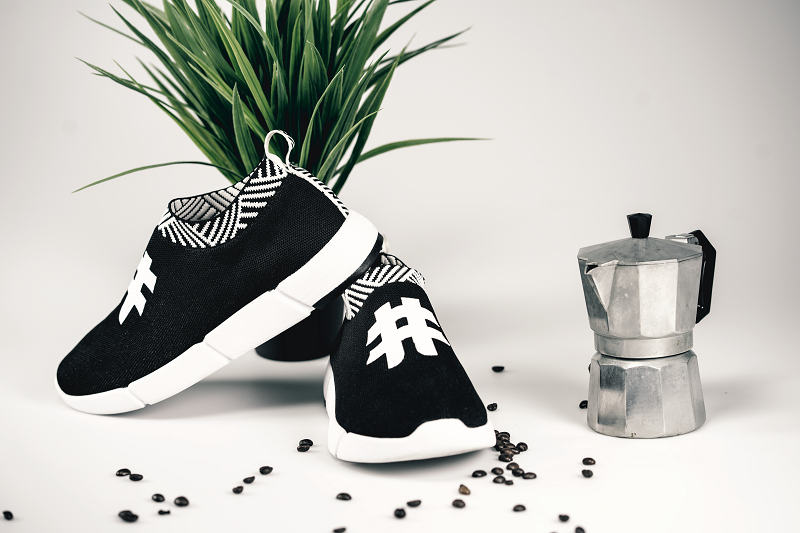Save the planet with these sneakers made from coffee grounds and recycled plastic
A pair of Rens’ first-generation ‘Original’ shoes contain 300 grams of coffee waste, the equivalent to 21 cups.

[Feb 3, 2022: Ben Anthony Horton]
A pair of Rens’ first-generation ‘Original’ shoes contain 300 grams of coffee waste, the equivalent to 21 cups. (CREDIT: Rens Original Footwear)
There’s nothing like a cup of coffee in the morning to clear away the cobwebs. And if you live in Finland, you probably drink more of the stuff than most.
Finns consume more java per-capita than any other nation in the world, according to the International Coffee Organization. And with all of those beans comes an awful lot of waste.
As much as 14,380,600 tonnes every year, in fact.
That equates to 13 per cent of Finland’s annual food refuse, with only fruit and veg being thrown in the bin more often than coffee gets poured down the drain.
It should come as little surprise, then, that a Finnish footwear firm is incorporating the caffeinated grounds into its products.
Helsinki-based footwear firm Rens has created a waterproof trainer made from coffee waste and recycled plastic bottles.
It's an attempt to lessen the environmental impact of used coffee grounds, which emit as much methane as ten million cars every year.
"When we started, we actually realised that only five per cent of the coffee waste in the world actually gets recycled," says Rens co-founder and CEO, Jesse Tran.
"Coffee waste is a bio waste, but it produces a lot of methane, which is like 32 times more potent than CO2. So what we do here is just extend the life cycle."
A global problem
While the global demand for coffee is predicted to double by the year 2050, coffee cultivation is becoming more and more challenging, with climate change affecting plantations around the world.
A recent study indicates that coffee growers in Colombia - the world’s third largest producer of Arabica beans - could encounter significant environmental implications between the years 2042 and 2061.
Due to rising temperatures, areas of Colombia that are currently prime coffee growing locations may soon be too hot for these plants to survive.
The shrubs are incredibly sensitive to unpredictable weather, which affects both the quantity and quality of beans that can be produced. This has a knock on effect for the 125 million people who depend on coffee production for their livelihoods.
Related Stories
Wear your waste
In short, a reduction in coffee waste in landfill sites could benefit the industry.
The world’s love of coffee is unlikely to wane, so it’s crucial we find ways to recycle, renew and reuse its byproducts. This could reduce the build up of methane gases and diminish coffee's contribution to rising global temperatures.
And if you get a nice pair of trainers out of it too, what’s not to like?
A pair of Rens’ first-generation ‘Original’ shoes contain 300 grams of coffee waste, the equivalent to 21 cups.
"After you drink the coffee and throw the coffee grounds away, we actually mix it with recycled plastic pellets made from used water bottles," explains Tran. "We then create something called coffee polyester yarn. The majority of the upper part of our shoes is made from this material."
After coming up with the idea in July 2017, the company launched a KickStarter campaign that raised over €486,000 in under two months. A follow-up campaign in August 2021 raised an additional €300,000 - enough to produce a second-generation version of the sneaker called ‘Nomad’.
"In the market, sustainable products are really popular. What we see as a problem is that those products are not made for young people," says co-founder and CTO Son Chu.
"The way that they are selling the products is like: 'Hey, use us or else the planet is going to die.' We don't like that approach. We want to be a brand where we make sustainable products, but they are cool, they have really cool functions, people can actually use them."
In an effort to create a truly climate neutral product, Rens also claims to offset all emissions from the production, packaging and distribution of its products.
For now, sustainability comes at a price with a pair of the company's latest footwear costing €96.
But the early success of its coffee trainers has prompted the firm to explore new applications for its sustainable technology.
"Whatever product we make, we will apply the same formula, which is from waste-based material,” says Tran. “It can be coffee waste again, or it can be something else.”
So whether it's a pair of sneakers, a t-shirt or a jumper, one thing’s for sure: coffee waste is better off in your wardrobe than in landfill.
For more environmental good news stories check out our Green Impact section at The Brighter Side of News.
Note: Materials provided above by Ben Anthony Horton. Content may be edited for style and length.
Like these kind of feel good stories? Get the Brighter Side of News' newsletter.
Tags: #Green_Good_News, #Environment, #Recycling, #Plastics, #Coffee, #Shoes, #Innovations, #The_Brighter_Side_of_News
Joseph Shavit
Head Science News Writer | Communicating Innovation & Discovery
Based in Los Angeles, Joseph Shavit is an accomplished science journalist, head science news writer and co-founder at The Brighter Side of News, where he translates cutting-edge discoveries into compelling stories for a broad audience. With a strong background spanning science, business, product management, media leadership, and entrepreneurship, Joseph brings a unique perspective to science communication. His expertise allows him to uncover the intersection of technological advancements and market potential, shedding light on how groundbreaking research evolves into transformative products and industries.



